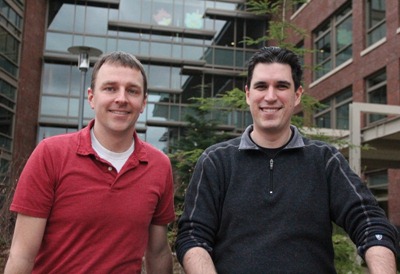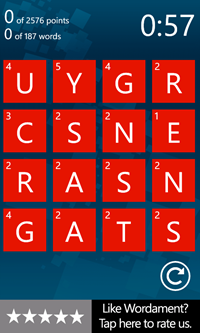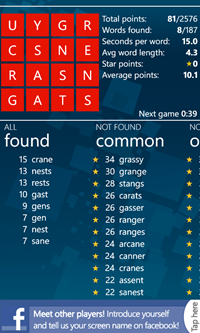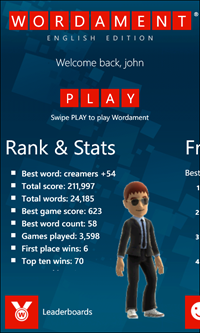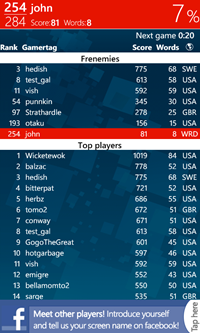Today Microsoft announced that Wordament, the popular and addictive Windows Phone word hunt game, is being rereleased as an official Xbox LIVE title for the phone. In another sign the former indie app has hit the big time, the game is also now available for Windows 8.
For Wordament creators John Thornton and Jason Cahill, today’s announcement caps a wild end to a wild year. The veteran Microsofties started working on the app on Valentine’s Day 2011, mostly as a fun after-hours sideline to their day jobs as program managers in Windows Live .“A little game to play with my wife and a couple of friends,” says Thornton, 37.
Today, Wordament has a global fan base and downloads “well into the six figures,” says Cahill, 38. The game—which maintains a near-perfect 4.5 star average on 4400 ratings—is also among the first born-and-bred Windows Phone titles to inspire unabashed app envy: Type its name into Bing or Google and up pops “Wordament iPhone”—a sign of lots of wishful searching.
Part of the game’s appeal is its simplicity: Players are presented with a 4×4 grid of lettered tiles and have two minutes to swipe in as many words as they can. When time’s up, you see all the words you found and a (typically much longer) list of common and obscure words you missed. (Read: 5 tips for boosting your Wordament score)
The other thing that makes the game unique is that it’s massively multiplayer: you and the rest of the planet battle on the same game board at the same time (hence the game’s “You vs. the Internet” tagline). The Wordament game server dishes out 523 unique puzzles a day, nonstop.
I recently caught up with Thornton and Cahill for a wide-ranging, two-hour conversation about the game and how it’s changed their lives. On the day we met, the duo were excited but exhausted—Cahill had been up most of the night putting final touches on the code for the new Windows 8 version. Here’s part of our exclusive sit down.
How did Wordament come about?
John Thornton: I made this little Boggle-style game board, and the notion was that you play against everybody. I set up a little server in my house on a single-core laptop, and I had this thing working where the phone could talk to my laptop over my Comcast DSL and pull the game board down. I showed it to Jason and he clearly got disappointed. He’s like, “That’s not how you do these things.” He’d just come off working on SharePoint Online, so he knew all about web services. He said, “What you’re doing is completely wrong.” [To Jason, laughing] You were visibly frustrated with my approach.
Jason Cahill: John said, “Well, do you wanna help?” And I said, “No, absolutely not.”
JT: It was almost a bit of slap down at the time. He said, “Dude, are you really going to spend your time on that? You have a family. You have a full-time job. You’ll make more money by focusing on your job.” But money wasn’t even in the equation at that point.
So what changed?
JC: I went home and I was like, Oh, that would be really cool. In fact, I know how to do it and he‘s doing it all wrong. [laughs]. So I started working on it that Friday night. I came in Monday—it was Valentine’s Day—and said, “Do you still want to partner up?”
How long did it take to finish?
JT: Six weeks from “let’s do this” to being done. I wrote the phone software, Jason did the game server.
JC: It showed up in Marketplace on April 1. We literally stayed up for 36 hours after it launched because we didn’t know if the service was going to run or fall over.
What’s the secret to the game’s success?
JC: It’s very simple, but one key is the game’s always running. You just get done with your results and—boom—you’re back in. We started noticing early on that our players didn’t come, play a few games, and leave. They stuck. They played 20 games in a row. I’m like, Oh my god, that’s a full hour! Also the fact that it’s a two-minute game. You always have two minutes somewhere.
One thing I’ve never liked about Words With Friends is waiting—days, sometimes—for my opponents to make their moves. And chatting with them while I play.
JC: You’re playing on their schedule, not on your schedule. With our game, you play when you want to play.
JT: Our joke is we’ve built an antisocial social network. You don’t need friends.
I see hints of Boggle and other word games. What else did you draw inspiration from?
JC: I love board games—the Marklin edition of Ticket to Ride is my favorite—and all good German board games have multiple ways to win. So it’s one of the things we did in Wordament. You can win by finding a few long words, or lots of short ones. We also added these secondary puzzles. We have “digram” puzzles with the special two-letter tiles and we have themed puzzles. We get people that will sit in the game—because the themes are every fifth puzzle—and wait for those.
How do you create the game boards?
JC: We build and curate all of our boards, so there’s no randomness. They’re made by machine with a heavy duty set of rules—about 25 at this point. This is all patented by the way. There’s very stringent criteria around what is an acceptable board versus what is not.
Rules like what?
JC: With the exception of our themed boards, every board must use every tile at least 3 times. We also guarantee you have over 100 common words on every board. Initially we shipped without the notion of common and obscure words, but we quickly realized it was really important. If you see a list of words that you don’t recognize, and you didn’t find, you’re kind of like, “What is this game?”
I often score by accidentally swiping words I didn’t know.
JT: I still really don’t know what TAE means, but I use it all the time.
JC: We have 177,000 words in our dictionary at this point, so we have pretty good coverage of the English language. But there’s some human curation that happens in there, too. My wife moves about 20 to 30 words a day from the common to obscure list in our game dictionary. We just got her an Oxford English Dictionary subscription. Now she’s like, “I know Chaucer used that in 1536, but he’s the only one!” [ed. For the record, Chaucer died in 1400. But we’re allowing Jason some creative license here.]
What about swear words, some of which I never see. Do you censor boards?
JC: We had to make a call about whether we were going to allow bad words or not, and we’ve been very principled about it. If a word’s primary and secondary definition is a racial slur, or if it’s purely obscene, we strike it. Right now we have 170 banned words. But it’s a fine line. We argue a fair amount about whether we should be in the censorship business at all.
JT: The problem is when you get into more competitive environments. “Sh** [ed. bleep!]” is fine in competitive Scrabble.
JC: We also have a lot of parents contacting us saying, “My seven-year-old who’s learning how to read loves this game!” So it’s a delicate balance.
I’m constantly amazed by some of the scores—some players are finding nearly a word a second! C’mon, they must be cheating.
JT: We had some of the same concerns in the beginning. We launched in six weeks and had no anti-cheating policies. Over time we’ve said, Let’s try to figure out how to figure out if somebody’s cheating. I don’t want to give away the details, but basically you can come up with algorithms. It’s actually pretty easy to figure out.
JC: It’s statistical analysis on par with what Visa is doing. We’re looking at how you just played versus how you played in the past.
So you’ve caught cheaters?
JC: Oh, yeah, every week. We catch them all the time and we ban them all the time. We’ve also flagged a small number of people who weren’t cheating, and are just legitimately amazing in a way we haven’t seen before. You can go to YouTube and see these people play. They’re amazing people. They’re just better than all of us.
In addition to all the time you must spend on the game code, you also have very active blog, Facebook, and Twitter followings. How important is that?
JC: It’s as much an engineering feature as anything else. We didn’t just build a piece of software, we built a community—and spend at least an hour to an hour and a half a day talking to them. We’ve got 2200 Facebook friends now. It keeps us super in touch with what people want. We don’t always do what they ask, but we always come back with an answer.
JT: It’s a family affair at Jason’s house. His whole family’s into it.
JC: We also fix bugs in the community every day. Right now we have four players on the United States on AT&T that can’t play. We’re escalating issues and talking to AT&T—that’s not a trivial amount of work.
JT: We’ve spent hours on these four players. But we have to—they’re not able to play. It’s not OK.
How did you wind up moving from Windows Live to Xbox and running your own “micro” game studio?
JC: At one point Microsoft Game Studio made us this incredible offer. They said, “You guys are doing this as your night job. You’re probably incredibly tired. Would you be interested in just coming over and making Wordament your day job?”
JT: The decision wasn’t without heartache. We had great jobs working in Windows Live. But it became clear to Jason and I that there was an opportunity to do something big, possibly household-name big. All of a sudden we have art people, we have sound people. It was an opportunity neither Jason or I could say no to.
Big like a Windows 8 version of the game, for example?
JC: The coolest thing is not just that there’s a Windows 8 app, but that it’s the same competition. You’re in the same room as all the people on the phone. So it doesn’t matter what device you play on. If you want to play Wordament, you’re going to play the same board, against the same people everywhere on Earth.
The new Xbox LIVE version of Wordament isn’t too shabby looking either. It’s been translated into 7 languages and features new Spanish puzzle boards. Was it fun to work on?
JT: We had a lot of fun creating the achievements. We felt pretty strongly we want to have it mean something, so we have a couple that are really hard, like getting in the Top 10.
You guys have no shortage of interesting things to talk about.
JT: We’re fascinating at cocktail parties.

